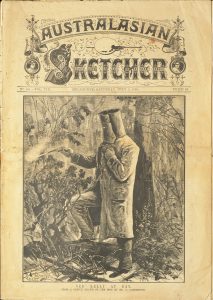
He spent several years operating as a bushranger in Victoria and southern New South Wales.
He was finally caught at Glenrowan (Vic.), following a shoot-out between the Kelly Gang and the police.
Ned Kelly was put on trial for murder, was found guilty, and was subsequently hung in Pentridge Prison, Melbourne, Victoria, on 11 November 1880.
According to some witnesses, Kelly’s last words were “Such is life”.
IAC articles about Ned Kelly:
The birth of Ned Kelly
Ned Kelly’s date of birth is unknown. This article says that the most likely date for the birth of Ned Kelly would appear to be December 1854; however, January 1855 is also a strong possibility. The article concludes that the evidence gives credence to December 1854 as being the likely month of his birth.

The Complete Inner History of the Kelly Gang and Their Pursuers [by J. J. Kenneally, 5th edition, 1946]
The classic non-fiction book about the Kelly Gang, by J. J. Kenneally.
Articles about Ned Kelly:
Benalla Police Court [22 October 1869]
Ned Kelly charged with highway robbery of Ah Fook.
Intercolonial news: Victoria [27 October 1869]
The trial of Ned Kelly for the highway robbery of Ah Fook.
Benalla Police Court [29 October 1869]
Ned Kelly is charged with assaulting and robbing Ah Fook.
[Several members of a notorious family] [17 April 1878]
Ned Kelly’s family accused of attacking Constable Fitzpatrick.
Desperate affray at Benalla [23 April 1878]
Article regarding the (alleged) shooting of Constable Alexander Fitzpatrick.
Fatal encounter with bushrangers in Victoria [31 October 1878]
The shooting of police at Stringybark Creek by Ned Kelly and his gang.
The Mansfield murderers [19 December 1878]
An article about Ned Kelly, his letter to Donald Cameron, and the Kelly gang’s killing of three policemen at Mansfield. Appended to the article are several reports considered to be relevant to the Kelly gang.
Interview with Ned Kelly [14 August 1880]
In this interview with a journalist, Ned Kelly gives his side of the story, and says that he did not shoot Constable Fitzpatrick.
Ned Kelly: A sketch in court [6 November 1880]
An article about the trial of Ned Kelly.
The execution of Ned Kelly [11 November 1880]
An article regarding the hanging of Ned Kelly, and the moral lessons to be learnt from it.
The execution [11 November 1880]
An article about the hanging of Ned Kelly. On the day of his hanging, when informed of the exact hour of his execution, Ned Kelly replied “Such is life”.
[The ignorant and misguided criminal, Edward Kelly] [12 November 1880]
An untitled article, regarding the hanging of Ned Kelly, and the moral lessons to be learnt from it. The article especially condemns those people who admire Ned Kelly.
Hanging of Ned Kelly [17 November 1880]
An article about the hanging of Ned Kelly, giving various details.
Ned Kelly’s gang: The making and breaking of bushrangers [18 December 1920]
A history of Ned Kelly and his gang.
Letters and statements written by Ned Kelly:
The Jerilderie letter [1879]
The Jerilderie Letter, dictated by Ned Kelly to Joe Byrne, has been described as Ned Kelly’s “manifesto”, and gives a detailed account of Ned’s relations with the police, including the unjust treatment his family had received at the hands of the law. It was intended for publication in Victorian newspapers.
The Parkes letter [1879]
A letter sent to Sir Henry Parkes (Premier of New South Wales).
The Cameron letter [1878]
A letter sent to Donald Cameron (a Victorian politician) about the case of Trooper Fitzpatrick against Mrs. Kelly, as well as regarding the shooting of the police at Stringybark Creek.
The Babington letter [1870]
A letter sent to Sergeant James Babington (of the Kyneton police).
Kelly’s last statement [by Edward Kelly, 12 November 1880]
The text of a letter, or statement, from Ned Kelly to the Governor.
Poetry regarding Ned Kelly:
Lines on the Death of Sergeant Kennedy [poem by R. G. S. (John Neilson, senior), 1 January 1879]
A poem about the shooting of police sergeant Michael Kennedy (1842-1878) by Ned Kelly, written by “R.G.S.” — a pseudonym of John Neilson (1844-1922).
Ned Kelly was a Gentleman [poem, 1940s]
A poem regarding Ned Kelly. It was apparently written during the Second World War (1939-1945), after the Japanese attack upon Pearl Harbor (7 December 1941). It was possibly composed around the time of the battle of Milne Bay (August-September 1942).
Poetry by Ned Kelly:
Poetry by Ned Kelly [1878]
Two small pieces of poetry, included by Ned Kelly in one of his letters.
References and further information:
John V. Barry, “Kelly, Edward (Ned) (1855–1880)”, Australian Dictionary of Biography, National Centre of Biography, Australian National University [says Ned Kelly was born in June 1855]
IronOutlaw.com
“Two huts at Stringybark Creek”, Bill Denheld
Jerilderie letter, National Museum of Australia [archived] [says Ned Kelly was born “about December 1854”]
“Ned Kelly fact sheet”, State Library of Victoria [archived]
“Ned Kelly”, Wikipedia
Updated 3 November 2023
Ned Kelly was a wonderful man.
He did things for a reason. His family was poor and the Kellys were going through a lot.
Ned was ” Hanged ” not ” Hung “. Paintings are hung on a wall but the correct grammar for a prisoner is hanged ; Even if it does not sound right.
Modern society does not hang people anymore so the correct term has been forgotten. I am old enough to remember the correct term as criminals and murderers were hanged when I was young.
Thank you for your contribution.
Certainly, it was common for a judicial death sentence to be expressed by a judge as “hanged until dead”. However, it can be correct to use either “hanged” or “hung” regarding the legal hanging of a person. Whilst some believe that the former is the only correct usage, both usages are correct.